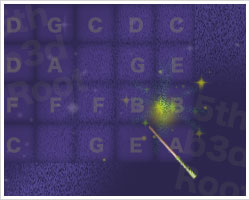The process of spelling chords (also known as 'building chords') refers to being able to name the tones that are found in a particular chord. Given the name of any commonly used chord, most accomplished musicians can quickly tell you the chord tones which comprise that chord.
For example, if you see or hear the chord Em, you should be able to immediately recite "E, G, B" - the chord tones for Em. Recall the following formulas (scale degrees from the major scale) for building these common types of chords:
| A Major Scale: |
A |
B |
C# |
D |
E |
F# |
G# |
| 1 |
2 |
3 |
4 |
5 |
6 |
7 |
| Major Triad: |
1 |
3 |
5 |
| ex. A Major (A, C#, E) |
| Minor Triad: |
1 |
b3 |
5 |
| ex. A Minor (A, C, E) |
| Diminished Triad: |
1 |
b3 |
b5 |
| ex. Adim (A, C, Eb) |
| Augmented Triad: |
1 |
3 |
#5 |
| ex. Aaug (A, C# E#) |
| Major 7th: |
1 |
3 |
5 |
7 |
| ex. Amaj7 (A, C#, E, G#) |
| Dominant 7th: |
1 |
3 |
5 |
b7 |
| ex. A7 (A, C#, E, G) |
| Minor 7th: |
1 |
b3 |
5 |
b7 |
| ex. Am7 (A, C, E, G) |
| Minor 7th, Flat 5: |
1 |
b3 |
b5 |
b7 |
| ex. Am7(b5) (A, C, Eb, G) |
Eventually, you want to be able to quickly spell out the tones for any chord in any key. Chord Spells will make you a wizard at spelling all kinds of triads and seventh chords.
Chord Spells
When you see a chord name such as Amaj7 or Gm7(b5), can you quickly name the tones that make up the chord? This process is called 'spelling' a chord, and is an important part of music theory that helps you build arpeggios quickly. Our new game Chord Spells will give you extensive - and FUN - training in the practice of Chord Spelling!
Play

